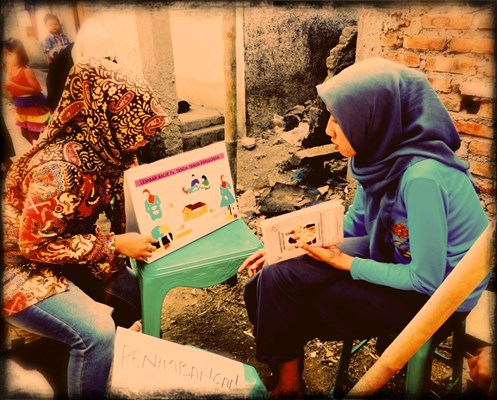
By Rukhsana Ahmed, Sudirman Nasir, Licia Limato and Korrie de Koning
Cianjur is one of the nine districts in West-Java Indonesia, and it is one of the districts with the highest maternal mortality rates in the country, despite close proximity to the capital city. To support the district health system in improving maternal health services, REACHOUT research identified the need to improve birth preparedness and to work with Posyandukader (one type of close-to-community health workers in Indonesia) in counselling pregnant mothers and communities about maternal health issues.
Health promotion and supportive supervision training
REACHOUT Indonesia developed a health promotion and supportive supervision training and follow up programme to improve the communication skills of the Posyandukader and village midwives. The aim of the programme was to inform women about dangers in pregnancy and childbirth, negotiate the common goal of a healthy pregnancy and delivery, and promote the supportive supervision of village midwives and Posyandu kader in a structured manner.
An evaluation of this intervention was conducted through individual interviews, group discussions and a most significant change (MSC) methodology with women, key informants, village midwives, kaders and supervisors. It demonstrated encouraging results. Pregnant women appreciated that Posyandukaders were better able to answer questions and that women and pregnant women are receiving more information than previously, as one mother in the study confirmed:
“After the kader received training, I observed kaders are showing more care to Posyandu visitors. Now, kader give information that pregnant women with labour signs should seek help immediately. I used to ask something to kader but only Mrs E could answer it and other kaders were unable to answer. Now they are able to provide comprehensive information with examples and what are the things that pregnant women must do if the labour signs happen.”
This viewpoint was echoed by the kader:
“[This is] the first time pregnant women are aware of the signs of labor, breastfeeding, and postnatal care…Bbefore the REACHOUT training, the knowledge then was likely to be only known by mothers who are pregnant with their third child. I also observed that as the pregnant women became aware of health [issues]; it encourages their husband to participate in supporting their wife to give birth in a health facility by providing them the delivery budget.”
Most kader were enthusiastic about their new knowledge and expanded skills, and felt motivated by the ability to answer questions:
“Back then, I was easy to become furious, emotional, and upset because I didn’t know how to answer those questions. Now I feel happy because, with my limited educational background (elementary school), limited knowledge and experience, I can still help people in my area.”
The following quote from one of the midwives illustrates how village midwives improved the interaction with clients:
“Training gave me knowledge about how to face the community and negotiate their issues with them... earlier I thought that the patient must agree with my decision but now as a village midwife, I am not allowed to force the patient. I just have responsibility to give suggestions and let the patient make their own decision.”
Village midwives also shared how the improved knowledge of kaders assisted in timely referral:
“Kaders became more pro-active. I was called to the house by the kader…it turned out that the opening (of the cervix) was already complete while the mother was apnoea. I directly referred her to the hospital. Fortunately, I have kaders who inform me about that.”
In summary, results show that the health promotion and supportive supervision training improved the ability of kaders to share knowledge with mothers and changed the approach to communication with pregnant mothers by some of the village midwives and the Posyandu kaders. This positively affected the appreciation of the mothers and increased the motivation of kaders to conduct counselling.
What worked well were interactive learning approaches in small groups, feedback during follow up observations, the use of appropriate, newly developed counselling cards and the support and supportive supervision by midwives. At the same time, improved management of the Posyandu created a more conducive environment for conducting the counselling.
Recent news
- Measuring quality in Malawi’s community health system: Barriers and challenges, 31 August 2017
- Do devolved Kenyan county governments prioritise universal health coverage?, 10 August 2017
- Improving maternal health in Shebedino district, Ethiopia: Positive stories need to be told, 1 August 2017

This project is funded by the European Union.
